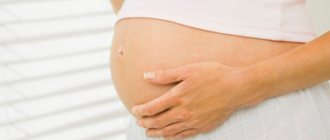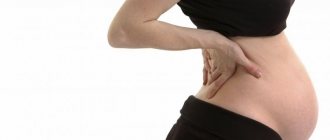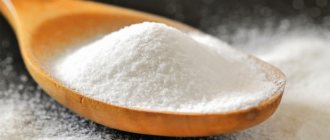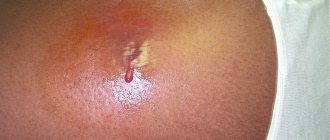Causes of diarrhea at 40 weeks of pregnancy
The main cause of diarrhea in late gestation is prenatal activity. Liquid stools form from 37 weeks. This is a physiological process associated with the lowering of the uterine fundus and pressure on the rectum and bladder. The body, in preparation for childbirth, actively cleanses itself, especially during the first pregnancy. Additional signs are nausea, vomiting.
Other physiological causes that are not dangerous include hormonal changes, during which the hormone prostaglandin is actively produced. Physical activity plays an important role, which should be reduced during this period.
But there are pathological reasons that should alert a pregnant woman:
- Intoxication of the body with drugs, poisonous gases, household and other chemicals, food. Poisoning is accompanied not only by loose stools, but also by vomiting, dizziness, pain syndromes, increased body temperature, bloating and weakness.
- Infection with viruses, bacilli, bacteria (salmonella, enterovirus, rotavirus, cholera, dysentery, etc.). This is due to the woman’s reduced immunity. Diarrhea occurs when infected with nausea and vomiting, loss of appetite, chills, and high body temperature.
- Helminth infestation is considered a dangerous cause, since helminth larvae penetrate the fetus, causing it harm. During growth and reproduction, worms eat all the beneficial substances, leaving behind toxic waste products. When a helminthic infection occurs, frequent diarrhea occurs, appetite increases, weight decreases, and muscle pain is felt. Features: teeth grinding, craving for sweets, itching in the anus, lethargy, mental disorders.
- Unusual reactions of the body to familiar foods occur due to hormonal imbalances. At week 40, the body reacts negatively even to fresh vegetables and fruits.
Listed above are the main causes of diarrhea during pregnancy. However, there are a number of other, less common reasons:
- stressful situations, excessive worries and worries;
- diabetes mellitus and other diseases of the endocrine system;
- intestinal ischemia;
- vasculitis;
- failure of the liver;
- gastritis and pancreatitis;
- irritable bowel syndrome;
- consumption of alcoholic beverages;
- eclampsia as a complication of pregnancy.
It is possible to identify the cause and make an accurate diagnosis only after a comprehensive examination. This will allow you to prescribe the correct treatment regimen.
Heartburn before childbirth - why it gets worse, and is it a sign?
Pregnancy, an already established pleasant and happiest time, is often overshadowed by problems during its course. Heartburn before childbirth is the most unpleasant and common end to a happy period. Why do the presented symptoms occur before childbirth, and can heartburn be regarded as a harbinger?
Causes of heartburn during pregnancy
During pregnancy, a woman experiences the presented troubles in a gradual increase. As the fetus grows, the expectant mother suffers from displacement of internal organs, which in most cases is felt by the rising of the stomach and esophagus - this leads to the involuntary release of its contents and the occurrence of heartburn.
In the future, the woman experiences painful heartburn in the later stages, when the baby in the womb begins to gain weight. The volume of the uterus increases, so in the final stages of pregnancy it puts quite a lot of pressure on the stomach.
The expectant mother tries to maintain a diet, but everything is useless, because gastric juice begins to leak out of the empty organ into the esophagus, which also provokes a burning sensation.
There are other causes of heartburn in a pregnant woman:
- Hormonal changes. If symptoms do not appear in the early stages, and before giving birth the woman cannot cope with the attack, most likely we are talking about a sharp change in hormonal levels. This may indicate the fact that the body is preparing for childbirth. In this case, you should monitor for the presence of additional problems - vomiting and diarrhea are also symptoms of close labor.
- The sphincter of the gastrointestinal tract suffers from pressure from the uterus. This also leads to discomfort.
- The reason why heartburn worsens before childbirth is often due to overeating. The principle of “eating for two” is still practiced today.
- Overeating leads to unreasonable growth of the fetus, which also affects the condition of the expectant mother. Often the presented symptoms are observed in expectant mothers with large children or several in the uterus. In this case, the esophagus and stomach rise even higher than in the standard situation.
We recommend watching: Preparing for childbirth, useful tips!
The most unfavorable cause of heartburn during late pregnancy is breech presentation of the fetus. In this case, the child presses on the mother's stomach with his head.
If the expectant mother is constantly undergoing examination, she should know the position of the baby in the uterus. If you have a breech presentation, you should not pay attention to the appearance of heartburn even on an empty stomach and for a short period of time.
It is better to immediately resort to general recommendations for elimination.
We recommend reading: Heartburn as one of the signs of pregnancy
Heartburn – a harbinger of labor or vice versa
Most expectant mothers wonder whether heartburn could be a harbinger of labor. After all, many people think so, preparing each time for birth as soon as the symptoms intensify. However, obstetricians-gynecologists themselves say the opposite. If the pregnancy proceeds without serious complications, then the expectant mother should get rid of the symptoms of heartburn before giving birth.
This is explained by a simple physical manifestation - a pregnant woman’s tummy drops, which is normal for prenatal activity. This happens in the last week of pregnancy or already a few days before birth.
Therefore, the expectant mother should pay attention to the abrupt end of heartburn, especially if the symptom accompanied a longer period of time in an interesting position.
It turns out that heartburn is a harbinger of childbirth, but in its opposite manifestation.
Prevention
If you have heartburn attacks throughout your pregnancy, it will be difficult to get rid of the attacks before giving birth. Since medications that act quickly cannot be taken during a happy period, it is better to prevent troubles. Prevention methods include:
- do not eat before bed - it is better to do this a few hours before rest;
- refuse to eat a lot of food - this applies not only to dinner, but also to all its meals;
- remove from your diet all harmful foods and dishes that can cause heartburn - these are spicy, fried foods and smoked foods;
- Pregnant women are recommended to do special exercises that help get rid of symptoms - stretching the legs or arms will help, it is important to avoid bending and turning;
- it is necessary to wear loose clothing made from natural materials;
- for prevention, it is recommended to consume fermented milk products every day - milk, kefir, yogurt; cottage cheese should be treated with caution;
- it is important to give up all kinds of vegetables and fruits that contain large amounts of vitamin C and other acidic components - give preference to vegetables and fruits with soft substances, or eat them after heat treatment;
- During pregnancy, it is recommended to drink compotes, herbal teas and still mineral water - the amount of liquid will have to be controlled so as not to provoke late edema.
Drinks should be treated with caution if a woman has already been diagnosed with gestosis and other pathologies leading to edema.
Getting rid of heartburn at home
You can get rid of heartburn in late pregnancy by using various infusions and decoctions. The most effective include the following:
- Pour a tablespoon of dried centaury into a glass of boiling water and leave to steep for several hours. Then filter the infusion and drink a tablespoon each time before meals.
- Buy calamus root powder. Use it in its pure form, a third of a dessert spoon each time before meals.
- Use infusions of dill, St. John's wort or chamomile. Dry and chop one of the herbs, and then pour boiling water over a tablespoon of the mixture. Take a tablespoon each time before meals, strained.
- An excellent remedy is potato juice, which is taken in the morning on an empty stomach, a quarter glass. The course of treatment takes 10 days. Then they take the same break, and then resume treatment.
Since the occurrence of an attack of heartburn can vary depending on the time of day, you should not wait until the attack has already overcome - it is better to prevent it using the indicated traditional medicine.
We advise you to read: Allowed foods for pregnant women for heartburn
Is diarrhea dangerous at 40 weeks of pregnancy?
If diarrhea is physiological in nature, then there is no need to worry about this, but with prolonged diarrhea against the background of pathological changes, the following consequences may occur:
- Dehydration of the body, leading to the development of diseases of various body systems, including death. This is due to the fact that the water-salt balance is disturbed, all useful substances are washed out, which helps to thicken the blood and slow blood circulation. Dehydration is manifested by increased weakness, dizziness, decreased blood pressure, dry mouth, thirst, and drowsiness. A woman’s number of daily urinations decreases, dark circles form under her eyes, and noise is felt in her ears. As dehydration progresses, fainting may occur.
- Diarrhea leads to increased peristalsis and motility, which increases uterine contractions - labor may begin prematurely.
- Danger to the fetus - infection, deficiency of nutrients. In the future, this is fraught with hypoxia (oxygen starvation), delayed development of the newborn, the occurrence of chronic diseases, and death.
Diagnostics
Diagnostic measures when diarrhea occurs at 40 weeks of pregnancy are necessary to determine the cause of diarrhea, which will allow timely treatment to begin, avoiding complications for the mother and fetus.
What examination is prescribed:
- Laboratory testing includes stool and blood sampling for general and biochemical analysis. This allows you to identify infections and determine the degree of dehydration of the body.
- Instrumental diagnostics - ultrasound examination of the gallbladder, kidneys, spleen, liver, pancreas, endoscopy, coprogram.
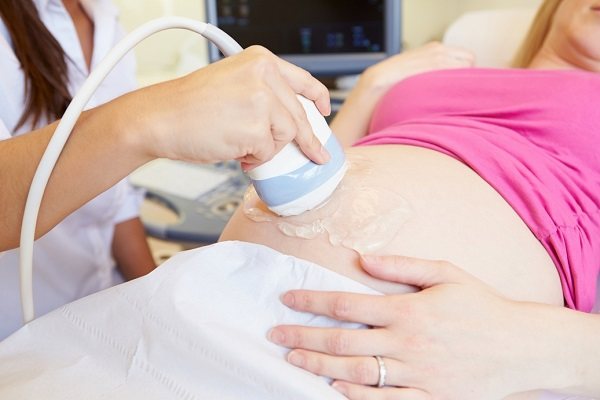
Symptoms of diarrhea for a long time
To accurately determine that diarrhea is caused by impending labor, it is necessary to monitor the stool and accompanying symptoms. Even if a woman is not yet having contractions, the onset of labor can be predicted by the presence of certain signs:
- I have a stomachache;
- Constantly pulling in the lower back;
- increased gas formation appears;
- morning nausea and vomiting develops;
- chills;
- temperature rises;
- headache.
No treatment is required for these symptoms. They go away on their own as labor progresses.
We recommend: Treatment of diarrhea during breastfeeding - how to safely continue lactation
If diarrhea is accompanied by the release of blood and mucus, you should immediately consult a doctor, or even call an ambulance. Such symptoms indicate the presence of an infection that requires urgent treatment.
Treatment
The method of therapeutic approach is determined based on the cause of diarrhea. An obligatory point is the elimination of unpleasant symptoms, restoration of disturbed microflora, peristalsis, and motility. Treatment includes taking medications, using folk remedies, dietary nutrition and special exercises.
Nutrition
The diet is based on normalizing the functionality of the digestive system. rules must be followed :
- strictly monitor your water regime - drink at least 2 liters of water;
- eat food 5-6 times a day in small portions;
- on the first day of diarrhea, completely refuse food, then introduce permitted cereals and boiled vegetables;
- food should have a temperature no higher than +37 degrees;
- Steam or boil dishes (in extreme cases, bake without fat).
Prohibited foods:
- coffee, carbonated drinks;
- vegetables - cucumbers, radishes, radishes, beets;
- fruits that cause loose stools (apples, plums, apricots, etc.);
- sweets in any form;
- baked goods;
- canned food;
- smoked meats, ham, sausages;
- fast food;
- fatty meat and fish;
- juices;
- milk;
- beans.
What is allowed and recommended:
- porridge of rice and oatmeal;
- boiled lean meat and fish;
- decoctions of herbs, rose hips;
- fruits – persimmon, banana, quince;
- baked apples;
- hard boiled eggs;
- unsweetened yogurt;
- tea.
The best way to consolidate stool is to consume rice water. For 1 liter of water you will need 1-2 tbsp. l. rice Cooking time is 20-30 minutes, after which strain the liquid and drink 100 ml throughout the day.
Gymnastic exercises
Thanks to physical activity (special exercises), intestinal motility is restored, the woman’s emotional state is normalized, and blood circulation is accelerated. However, at 40 weeks of pregnancy, many gymnastic exercises are contraindicated, so it is better to use breathing exercises that do not harm the fetus and mother.

Breathing exercises (performed in a sitting or standing position):
- Take a deep breath, then exhale, holding your breath. Draw your stomach in for a count of 3. Inhale again, relaxing your abdominal muscles.
- The second exercise is identical to the first, but with the difference that now the stomach should not be pulled in, but inflated.
- Start inhaling, holding your breath for a couple of seconds, tensing your diaphragm. While continuing to inhale air, push your abdominal cavity forward. After holding your breath for another 3 seconds, inflate your stomach and immediately relax while inhaling.
- Quickly draw in your stomach and exhale at the same time. Hold your breath for 4 seconds, then relax your muscular system. Inhale, expanding your belly.
Repeat each exercise, starting with 3 approaches, gradually increasing the number of approaches up to 8 times. Exercises should not bring pain or discomfort.
Taking medications
At 40 weeks of pregnancy, the fetus is considered fully formed, so doctors allow you to take many medications. What can be prescribed:
- The first thing to do is to eliminate dehydration, for which rehydrating solutions are used - Regidron, Trisol, Gudron. They are based on salt and water.
- To normalize the microflora and remove toxic deposits (in case of poisoning and infection), adsorbents are used - Smecta, Polysorb, Activated carbon, Enterosgel, Polyphepan.
- Imodium, Diara, Lopedium, Enterobene are used to bind feces.
- To normalize the microflora, pro- and prebiotics are needed: Linek-s, Bifiform, Baktisubtil.
To eliminate the root cause, the doctor prescribes specific treatment (for helminthic infestations - anthelmintics, for allergies - antihistamines, etc.). The duration and course of pregnancy and the individual characteristics of the body must be taken into account.
Features of the term
The thirty-ninth week of pregnancy is approaching the finish line in the period of bearing a child. At this point, processes associated with the upcoming birth begin to start in the woman’s body. Periodically, the body gives the mother appropriate signals. Some of them can cause severe discomfort.
Diarrhea at 39 weeks of pregnancy most often indicates impending delivery:
- the baby is ready for birth;
- a woman's body is preparing to continue normal life without a fetus in the womb.
The fruit is fully formed. Its weight is more than three kilograms. The structure of the body and internal organs are already ready for birth. By this point, even hair appears on the head, and vision becomes capable of clearly distinguishing objects at a distance of 30–40 centimeters.
Another restructuring takes place in a woman’s body. The body stops “working” to maintain pregnancy. The placenta becomes thinner, the volume of amniotic fluid quickly decreases. But since the child is still in the womb, this causes some discomfort, including affecting the digestive processes.
Childbirth can happen at any time. Loose stools at 39 weeks of pregnancy are usually not dangerous and are a harbinger that it’s time to go give birth.
Prevention
To prevent pathological diarrhea at 40 weeks of gestation, it is recommended to adhere to the following preventive measures:
- observe the rules of personal hygiene;
- thermally process eggs, meat, fish;
- wash fruits and vegetables thoroughly, but it is better to eat them boiled or baked;
- treat chronic pathologies in a timely manner;
- watch your weight;
- don't overeat;
- do not try new and exotic dishes;
- avoid contact with infected people;
- store food correctly to prevent poisoning;
- In the summer, completely give up fish.
If you experience diarrhea at 40 weeks of pregnancy, immediately notify your gynecologist, who will refer you to other specialists for further examination. Remember that you are responsible not only for yourself, but also for your unborn baby.
Previous post Why does prolonged diarrhea occur, and how to cure it?
Next entry Diarrhea of viral origin: how to recognize and treat?

